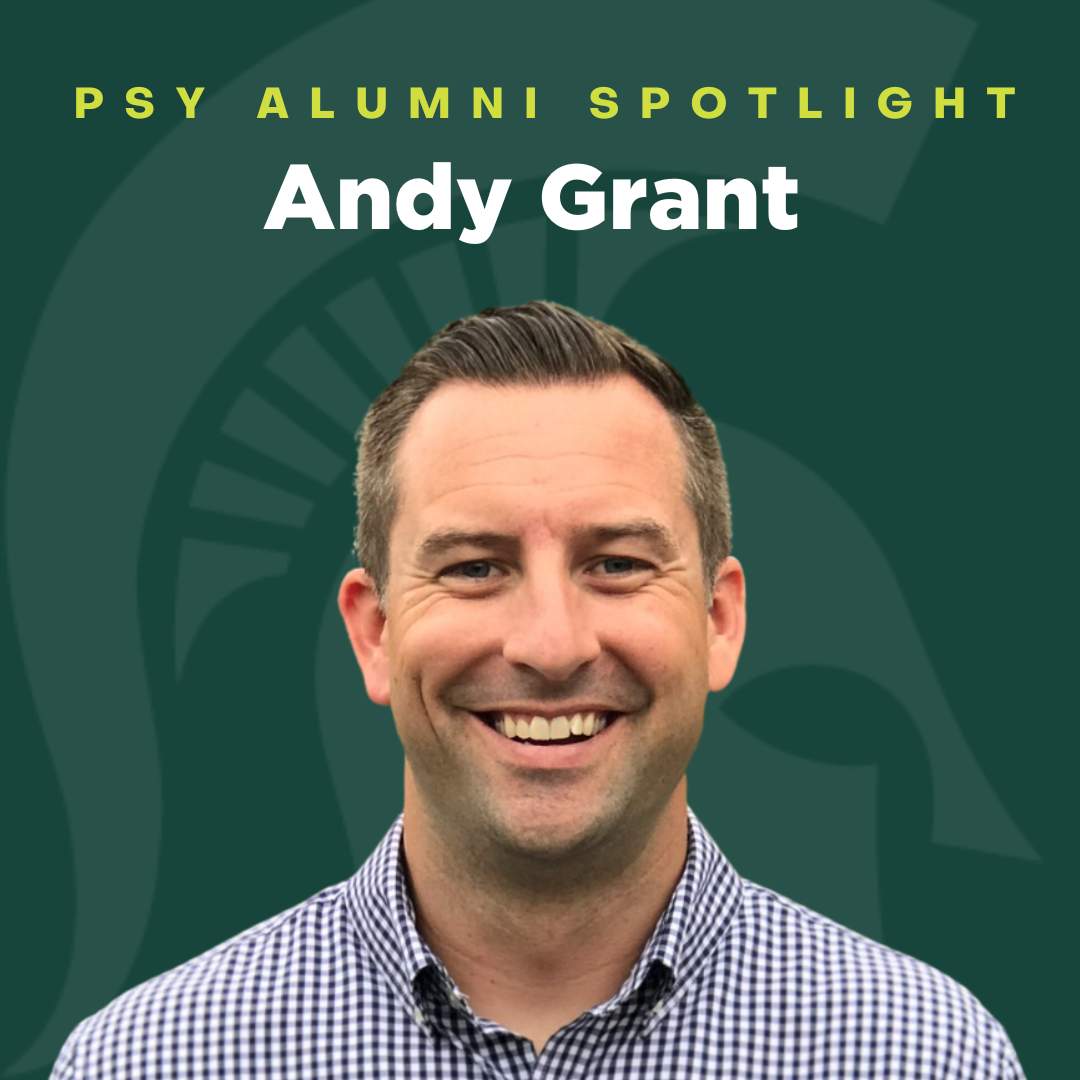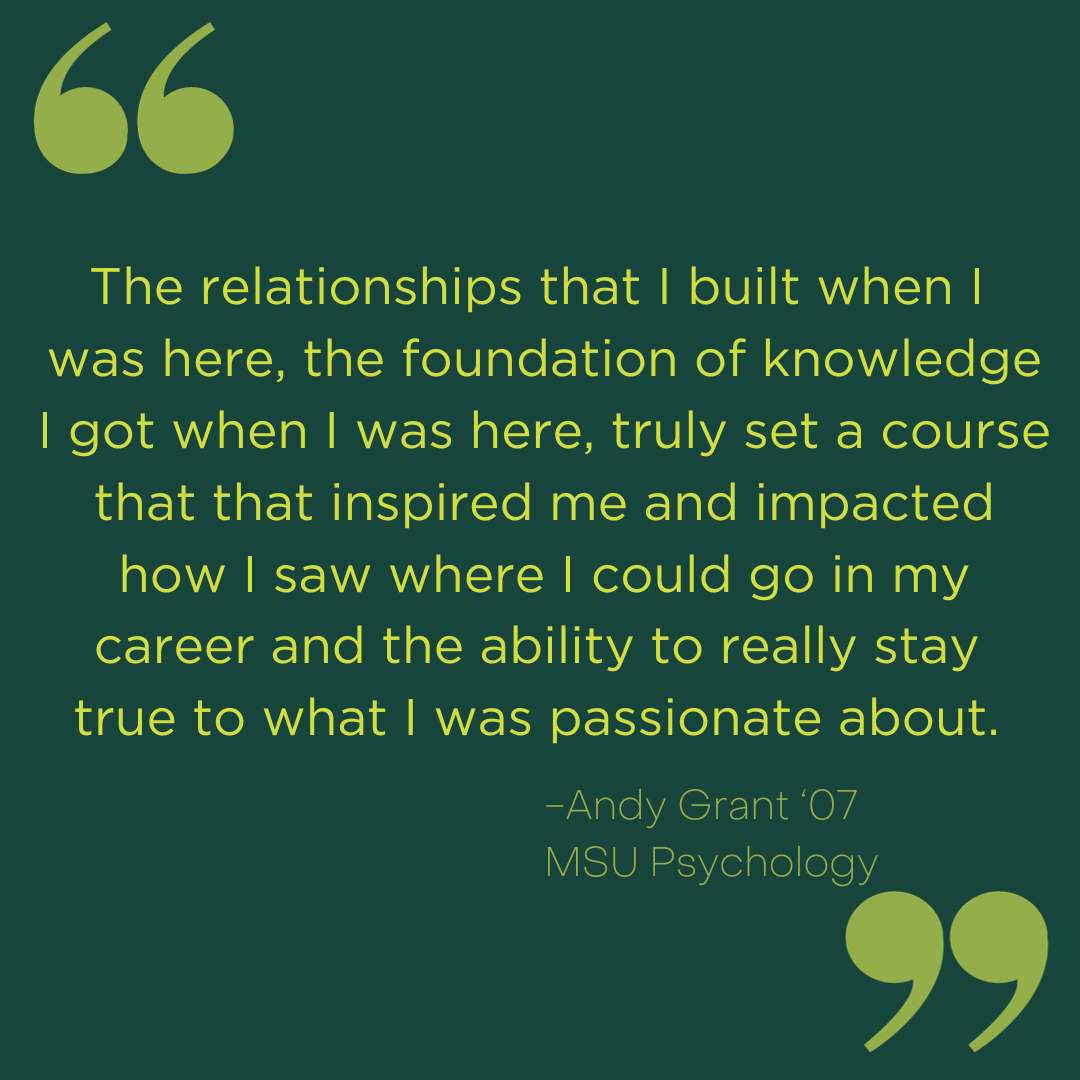From basketball courts to board rooms, how a PSY alumni is making an impact
November 16, 2023 - Shelly DeJong
 As an avid sports fan and player, alumni Andy Grant ‘07 came to MSU knowing he wanted to study sports psychology. Ever since he’s been using his background to help others, from sports teams to executive leadership teams, identify and achieve their goals. We recently sat down with Andy to hear about his time at MSU, how his psychology education has helped in every step of his career, and how he hopes to help others get 1% better.
As an avid sports fan and player, alumni Andy Grant ‘07 came to MSU knowing he wanted to study sports psychology. Ever since he’s been using his background to help others, from sports teams to executive leadership teams, identify and achieve their goals. We recently sat down with Andy to hear about his time at MSU, how his psychology education has helped in every step of his career, and how he hopes to help others get 1% better.
Why did you decide on majoring in psychology at MSU?
I grew up playing sports, primarily football and basketball, and always found myself interested in the psychological side of the sport. I had a basketball coach who kind of opened the door to me in sports psychology. When I had the wonderful opportunity to come to Michigan State, I considered the kinesiology route of sports psychology but knew it wasn’t where my passion was. I didn't know exactly what I wanted to do at that point, or how I was going to do it, but I knew I loved psychology. I loved trying to get some answers about life's questions. I loved the curiosity it offered to explore. I was so passionate about how the mind worked, and I wanted to really focus on that aspect. I had great mentors who encouraged me to trust myself in what I was passionate about, which led me to decide to major in Psychology.
You are interested in Organizational Psychology and Sports Psychology. Can you talk about how that intersection happened at MSU?
I was taking Psych Statistics with Dr. Fred Oswald, who was here at the time, and started to really fall in love with looking at what the research and data tells us about something. I spent some time with Fred, and he offered me a chance to come check out his lab where they were looking at multitasking research related to personality traits. He mentored me, which I was very appreciative of. As a member of his lab, I learned a lot about research methods and that really sparked an interest in me in IO psychology. I loved seeing how we could look at companies, organizations, and businesses, and apply things to really help them maximize their potential to be successful. Throughout all of that, I saw that this could also be applied back to the sports world as well. A lot of different light bulbs went off for me as an undergraduate.
The relationships that I built when I was here, the foundation of knowledge I got when I was here, truly set a course that that inspired me and impacted how I saw where I could go in my career and the ability to really stay true to what I was passionate about.
What have you been up to since graduating?
I spent 10 years in a small consulting organization, focused on building an athletics department from the ground up. We developed assessments for student athletes, coaches, and team culture. We worked with colleges across the Five Power conferences and professional sports teams on recruiting better, enhancing player development, and growing team culture. I was able to come back to Michigan State and work with a couple teams as a consultant here. It was gratifying to come back and help teams at a place I care about. I really enjoyed that aspect of my professional career. I joined Leadership Resources in March 2020, and I am now the Director of Strategy for the company and sit on our executive leadership team. I support organizations through their strategic planning. I work with them to navigate challenges, whether those are with people, structure, performance, or a combination of things that they’re trying to work through. I help them define what success looks like, set a clear vision, and help them identify what the best next steps are to take towards their goals. I also spend time doing executive coaching for leaders and athletic coaches as well.
You've worked with sports teams to executive leaders, what do you see as the overlap?
No matter what industry you're in—a business or a sports team—the day to day might be different, but the foundations around how you motivate or develop people are very similar. There's a lot of key fundamentals like people buying into the vision, understanding how to drive the goals, knowing what part they play.
I think what was interesting to me is that everybody is a little different in terms of what motivates and inspires them. You could have a situation where an athlete is achievement driven, they want to get better, but they lack self-confidence. And if they're pushing themselves to get better every single day, but they don’t believe in themselves at the core, that’s a hard situation for someone to navigate. It’s also not limited to athletes; I see leaders with similar struggles. relationship. The more leaders know about themselves and their people, the more impact their team can have. We're only as good as the people we have on our team.
What is it that you love about what you do now?
 I like helping people get even just 1% better. If I can do something that impacts their work and how they achieve their goals or impacts their family life and allows them to be better at home for their family or makes them a better person and create opportunities for other people to have success, that’s what I love. The opportunity to drive people towards their goals and help them accomplish those goals is really fun. If I can do something that helps somebody's life be just a little bit better, I get to live my purpose.
I like helping people get even just 1% better. If I can do something that impacts their work and how they achieve their goals or impacts their family life and allows them to be better at home for their family or makes them a better person and create opportunities for other people to have success, that’s what I love. The opportunity to drive people towards their goals and help them accomplish those goals is really fun. If I can do something that helps somebody's life be just a little bit better, I get to live my purpose.
Has psychology specifically helped you in your career?
My background in psychology taught me how to build assessments, to break down data, and to look at its validity. That has been crucial to my work as a consultant. I know that data doesn’t matter if we don’t do anything with it.
It's also been important in my understanding how to work with people. Everybody's different. When you're in a room with four, six or eight leaders from an executive leadership team, you have a lot of dynamics in that room. Having an understanding and the foundation that I was able to build here at MSU has really helped me understand people at a better level and understand how to partner with them, how to work with them, and engage them in ways that we can do something meaningful together.
Do you have any advice for students?
Spend time with people. Ask people in an industry or an area that you are interested in to go for coffee, ask them to spend time with you. Ask them for advice. See if they'll mentor you. The best leaders are the people who will invest in other people. Be willing to reach out and be vulnerable. Be willing to ask questions. Nobody has it all figured out. Ask people to spend time with you and people will invest in you.
What’s your favorite MSU memory?
I loved going to games when I was here. I loved the opportunity to be a part of the lab that I was in. Being able to come back and coach coaches and athletes here was truly special to me. But the one that stands out to me was being able to bring my two daughters back and share campus with them. My family is the best thing in my life, so it was special sharing MSU with them. Go green!

